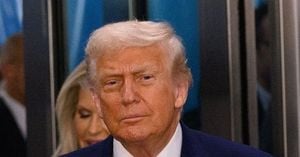In a packed Seattle courtroom on September 23, 2025, the U.S. government and Amazon began a high-stakes legal battle that could reshape how tech giants market and manage their subscription services. The Federal Trade Commission (FTC) has brought a civil case against Amazon and three of its executives, alleging that the online retail behemoth “tricked” millions of customers into signing up for its lucrative Prime membership through manipulative design tactics—commonly known as “dark patterns”—and then made it unnecessarily difficult to cancel.
At the heart of the trial is Amazon Prime, the company’s flagship subscription service, which costs $14.99 per month or $139 per year and offers perks like free expedited shipping and access to streaming video. According to NPR, Amazon last disclosed in 2021 that over 200 million people worldwide were Prime subscribers—a testament to the program’s massive reach.
The FTC’s allegations are sweeping. Regulators contend that Amazon’s website and app design nudged, and sometimes outright misled, users into enrolling in Prime memberships. For example, the FTC points to a large yellow button labeled “Get FREE Two-Day Shipping” as a swift way to sign up, while the option to decline—“No thanks, I do not want fast, free shipping”—was hidden in a small blue hyperlink. According to the government’s trial brief, “millions of consumers accidentally enrolled in Prime without knowledge or consent, but Amazon refused to fix this known problem, described internally by employees as an ‘unspoken cancer’ because clarity adjustments would lead to a drop in subscribers.”
But signing up was only half the story. The FTC claims that once customers tried to cancel Prime, they faced a labyrinthine process. The complaint details a “four-page, six-click, fifteen-option” journey to unsubscribe, which Amazon employees reportedly dubbed the “Iliad Flow” in reference to Homer’s epic poem about the protracted Trojan War. Lorrie Cranor, a professor at Carnegie Mellon University, told NPR that, “when you look at these deceptive and manipulative patterns, in some cases, it’s easy to believe that they were not intentional and they accidentally made it harder than it should be. And then there are other cases where you just have to conclude that they did it on purpose.”
The term “dark patterns” was first coined by user experience designer Harry Brignull, who likened the experience to being a “lab rat in a maze.” According to Monica Nickelsburg reporting for NPR, Brignull explained, “when you use a website or an app, you’re probably part of a psychology experiment that the business is running. They’re trying to work out what sort of design is most likely to get you to engage in the behavior that makes them the most money.”
Andrea Matwyshyn, a law professor at Penn State University and former FTC adviser, added, “the question is when design crosses the line into a situation where a reasonable consumer does not have a fair shot of understanding what’s going on.” She offered a memorable analogy: “If you hand me a stack of papers with all of the relevant terms about our contract and you decide to rubber cement two pages together, were the pages all there? Well, yeah, technically they were all there, but you did something extra where I was unfairly disadvantaged.”
Amazon, for its part, vigorously denies any wrongdoing. The company insists that Prime’s terms are clearly disclosed and that customers are always required to give affirmative consent before enrolling. In its trial brief, Amazon argued, “occasional customer frustrations and mistakes are inevitable—especially for a program as popular as Amazon Prime. Evidence that a small percentage of customers misunderstood Prime enrollment or cancellation does not prove that Amazon violated the law.” The company also claims there are at least 40 different ways for users to reach the cancellation page, and that once there, unsubscribing “takes a matter of seconds.”
Amazon further contends that its practices are in line with, or even clearer than, those of other subscription-based businesses. The company argues that the FTC is stretching a broad law against fraud to cover “dark patterns,” a term not explicitly defined in U.S. law. “There is no clear law that prohibits dark patterns,” Amazon’s brief states, pushing back on the government’s interpretation.
The stakes are enormous. If Amazon is found liable, the company could face damages worth hundreds of millions of dollars and fines up to $53,000 for each violation. Beyond the financial penalties, a ruling against Amazon could set a precedent discouraging other companies from employing similar manipulative tactics online. According to KUOW’s reporting, an FTC victory “could make an example of Amazon that discourages other companies from using dark patterns. But if Amazon prevails, it’s likely to be business as usual on the internet.”
The trial is expected to last about a month and will feature testimony from customers as well as current and former Amazon employees. Notably, the case is being decided by a jury—a rarity in complex antitrust and consumer protection cases involving tech giants. The proceedings are being overseen by Judge John Chun of the U.S. District Court for the Western District of Washington, who has already admonished Amazon’s legal team for “bad faith” conduct in the discovery phase and sided with the FTC in several procedural disputes.
While the current case focuses on Prime’s sign-up and cancellation processes, it serves as a prelude to an even larger lawsuit. In early 2027, the FTC is set to bring a sweeping antitrust case against Amazon, alleging that the company operates as a monopoly—a charge Amazon has called “wrong on the facts and on the law.” Both cases are being heard by Judge Chun, raising the stakes for Amazon’s legal strategy.
The FTC’s investigation into Amazon’s practices began during the Trump administration, but the lawsuit wasn’t filed until 2023, after Lina Khan, a well-known critic of Big Tech, took the helm at the agency under President Biden. The case could prove to be a landmark in the ongoing debate over how far regulators should go to police the digital marketplace and protect consumers from subtle, yet powerful, forms of manipulation.
For now, the eyes of the tech world—and millions of Prime members—are fixed on the outcome in Seattle. The trial’s verdict could ripple far beyond Amazon, influencing how companies design user experiences and disclose terms in the ever-evolving digital economy.
As the jury weighs testimony and evidence, the question remains: will Amazon’s approach to customer consent and cancellation be judged as savvy marketing or unlawful deception? The answer could shape the future of online commerce for years to come.





